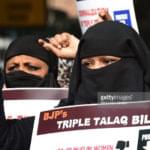Opinions
Myth and the Mystery about Indian Muslims — By Tanweer Alam
It’s absolutely untrue that benefits of economic development have bypassed India’s largest minority
At this point of time, the Lok Sabha election campaign seems to have assigned a higher value to the Muslim vote than their actual numbers in the Indian population—about 15% approximately —would warrant. The dadhi-topi-burqa (beard-cap-burqa) symbolism of the campaign was misleading in many ways, one of them being that Muslims looked like having not 15% of the vote, but 30 or 50%. A major illusion created by the campaign was that the dadhi-topi-burqa ensemble represents the sartorial preference of Muslims. One must remember that the ensemble is a reflection of denominational allegiances rather than the day-to-day, secular, religion-neutral dress choice of most Indians, including Muslims.
The repeated, deliberate injection of the Muslim angle in every electoral calculus gave quite a lot of people—including some Muslims—the impression that Muslims would decide who would win, Narendra Modi’s Bharatiya Janata Party (BJP) or its rival Congress. That is not a fact; it has never been the case. It is not Muslims who will decide who will rule the country, but Hindus. Even if one-fourth of Hindus decide to vote for some party, all the Muslims put together cannot prevent its victory.
If that is the case, what was the point of making such big fuss over the Muslim vote? The point was simple: the BJP did not woo the Muslims for their own sake, but to convince reluctant segments of Hindu voters about the liberal, modernist credentials of the party. It had to assure Hindu voters about their religious symbols’ protection, without looking like a bunch of bigots. We must remember that the Muslim vote is worth far less than it is made out to be. Several Muslim MPs come from areas with a relatively good number of Muslims, not necessarily from those constituencies which have the highest Muslim numbers.
Over the years, a certain mystique has been built around the Muslim voting pattern. The fact is that there is nothing extraordinary about it. First, about 90% of Muslim voters try to observe which non-BJP party the majority of Hindus seem to be voting for. They just vote that non-BJP candidate, whatever his or her party. They are mortally afraid of wasting their vote on a losing candidate, whoever he or she is. To get their vote, a party or a candidate must first have the maximum support of Hindu voters, because they know they alone cannot ensure anybody’s victory.
Of late, we have been hearing a lot about “tactical” and “strategic” voting by Muslims who constitute more than 20-30% in 60 constituencies. Some tactics or strategy is always involved in the voting behaviour of groups. Brahmins, Thakurs, Banias, Yadavs, Dalits and other castes and religious groups do look at the benefits coming to them if they choose a certain person or party. There is nothing exclusively Muslim about it. Interestingly, a major English newspaper has reported that in this election in UP, many Brahmins would vote tactically.
Other voter segments may not avoid being seen as bloc caste-voters for a leader or a party, but Muslims generally resent being labelled as a faith community that supports a single party. They will always tell you that Muslim vote is almost evenly divided between major “secular” (i.e. non-BJP) parties. Yadavs in Bihar may not think it necessary to refute that they are going to vote Lalu Prasad or Kurmis may not like to deny that they would vote for Nitish Kumar, but Muslims do resent being seen as loyal to a single party.
Hence this election cannot be seen either as “Muslims for Modi” or “Muslims versus Modi”. The game is more nuanced as far as Muslims are concerned. Their elders assert that they vote to protect the democratic, secular, constitutional order. They also emphasize rule of law and peaceful co-existence of groups.
To most Muslims, upholding of the rule of law and preservation of constitutional order is the first job of the state. A party that promises to do it has the first claim on their support. Even corruption is not their most important concern, and their vote support shows it.
It is interesting to note that the BJP’s share of the Muslim vote is not going to increase substantially from 5-8%. It is mainly because Muslims still see the BJP’s hand behind most anti-Muslim rioting and resent the BJP’s consistent policy of opposing every government move to empower the poor and weak Muslims—like its opposition to reservation for Muslims and the refusal by the Gujarat government to distribute central scholarship to Muslim students.
The valorization of Muslims in the electoral discourse does not correspond to their actual strength nor does it indicate the real intent of people who are doing it.
Beyond all this, one has to keep in mind the sacred ritual of vote must never be labelled as an adversarial play between Hindus and Muslims. That would be lethal for democracy. Happily, this is not going to happen even if we concede the latest survey that the BJP-led National Democratic Alliance will get about 250 seats. That means nearly 300 MPs would be from political parties that are not part of the NDA. This would not have happened if most Hindus voted for it.
Taking the electoral discourse out of the Hindu-Muslim format is important. After all, most Hindus voting for non-BJP parties are not doing so because they are annoyed by the events of 2002 in Gujarat.
Tanweer Alam is a Delhi-based social activist
